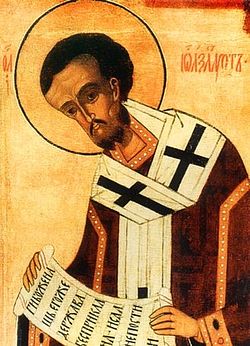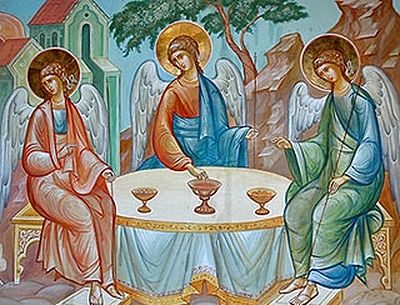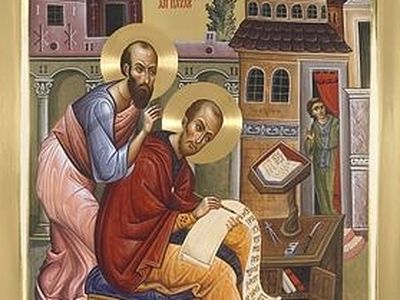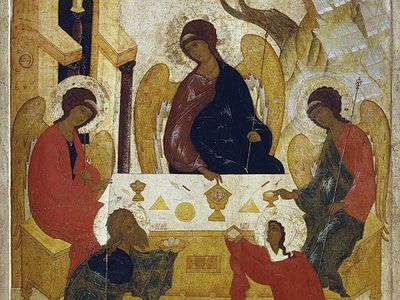 St. John Chrysostom
St. John Chrysostom
And what did He, when appearing unto them those forty days? Why, He conversed with them, says the writer, concerning the kingdom of God. For, since the disciples both had been distressed and troubled at the things which already had taken place, and were about to go forth to encounter great difficulties, He recovered them by His discourses concerning the future. He commanded them that they should not depart from Jerusalem, but wait for the promise of the Father. First, He led them out to Galilee, afraid and trembling, in order that they might listen to His words in security. Afterwards, when they had heard, and had passed forty days with Him, He commanded them that they should not depart from Jerusalem. Wherefore? Just as when soldiers are to charge a multitude, no one thinks of letting them issue forth until they have armed themselves, or as horses are not suffered to start from the barriers until they have got their charioteer; so Christ did not suffer these to appear in the field before the descent of the Spirit, that they might not be in a condition to be easily defeated and taken captive by the many. Nor was this the only reason, but also there were many in Jerusalem who should believe. And then again that it might not be said, that leaving their own acquaintance, they had gone to make a parade among strangers, therefore among those very men who had put Christ to death do they exhibit the proofs of His Resurrection, among those who had crucified and buried Him, in the very town in which the iniquitous deed had been perpetrated; thereby stopping the mouths of all foreign objectors. For when those even who had crucified Him appear as believers, clearly this proved both the fact of the crucifixion and the iniquity of the deed, and afforded a mighty evidence of the Resurrection. Furthermore, lest the Apostles should say, How shall it be possible for us to live among wicked and bloody men, they so many in number, we so few and contemptible, observe how He does away their fear and distress, by these words, But wait for the promise of the Father, which ye have heard of Me. You will say, When had they heard this? When He said, It is expedient for you that I go away; for if I go not away, the Comforter will not come unto you (Jn. 15:7). And again, I will pray the Father, and He shall send you another Comforter, that He may abide with you (Jn. 14:16).
But why did the Holy Ghost come to them, not while Christ was present, nor even immediately after his departure, but, whereas Christ ascended on the fortieth day, the Spirit descended when the day of Pentecost, that is, the fiftieth, was fully come (Act. 2:1)? And how was it, if the Spirit had not yet come, that He said, Receive ye the Holy Ghost (Jn. 20:22)? In order to render them capable and meet for the reception of Him. For if Daniel fainted at the sight of an Angel (cf. Dan. 8:17), much more would these when about to receive so great a grace. Either this then is to be said, or else that Christ spoke of what was to come, as if come already; as when He said, Tread ye upon serpents and scorpions, and over all the power of the devil (Lk. 10:19). But why had the Holy Ghost not yet come? It was fit that they should first be brought to have a longing desire for that event, and so receive the grace. For this reason Christ Himself departed, and then the Spirit descended. For had He Himself been there, they would not have expected the Spirit so earnestly as they did. On this account neither did He come immediately after Christ’s Ascension, but after eight or nine days. It is the same with us also; for our desires towards God are then most raised, when we stand in need. Accordingly, John chose that time to send his disciples to Christ when they were likely to feel their need of Jesus, during his own imprisonment. Besides, it was fit that our nature should be seen in heaven, and that the reconciliation should be perfected, and then the Spirit should come, and the joy should be unalloyed. For, if the Spirit being already come, Christ had then departed, and the Spirit remained; the consolation would not have been so great as it was. For in fact they clung to Him, and could not bear to part with Him; wherefore also to comfort them He said, It is expedient for you that I go away (Jn. 14:7). On this account He also waits during those intermediate days, that they might first despond for awhile, and be made, as I said, to feel their need of Him. And then reap a full and unalloyed delight. But if the Spirit were inferior to the Son, the consolation would not have been adequate; and how could He have said, It is expedient for you? For this reason the greater matters of teaching were reserved for the Spirit, that the disciples might not imagine Him inferior.
Consider also how necessary He made it for them to abide in Jerusalem, by promising that the Spirit should be granted them. For lest they should again flee away after His Ascension, by this expectation, as by a bond, He keeps them to that spot. But having said, Wait for the promise of the Father, which ye have heard of Me, He then adds, For John truly baptized with water, but ye shall be baptized with the Holy Ghost not many days hence. For now indeed He gives them to see the difference there was betwixt Him and John, plainly, and not as heretofore in obscure hints; for in fact He had spoken very obscurely, when He said, Notwithstanding, he that is least in the kingdom of heaven is greater than he: but now He says plainly, John baptized with water, but ye shall be baptized with the Holy Ghost (Mt. 11:11). And he no longer uses the testimony, but merely adverts to the person of John, reminding the disciples of what he had said, and shows them that they are now become greater than John; seeing they too are to baptize with the Spirit. Again, He did not say, I baptize you with the Holy Ghost, but, Ye shall be baptized: teaching us humility. For this was plain enough from the testimony of John, that it was Christ Himself Who should baptize: He it is that shall baptize you with the Holy Ghost and with fire (Lk. 3:6); wherefore also He made mention of John.
The Gospels, then, are a history of what Christ did and said; but the Acts, of what that “other Comforter” said and did. Not but that the Spirit did many things in the Gospels also; even as Christ here in the Acts still works in men as He did in the Gospels: only then the Spirit wrought through the Temple, now through the Apostles: then, He came into the Virgin’s womb, and fashioned the Temple; now, into Apostolic souls: then in the likeness of a dove; now, in the likeness of fire. And wherefore? Showing there the gentleness of the Lord, but here His taking vengeance also, He now puts them in mind of the judgment likewise. For, when need was to forgive, need was there of much gentleness; but now we have obtained the gift, it is henceforth a time for judgment and examination.
But why does Christ say, Ye shall be baptized, when in fact there was no water in the upper room? Because the more essential part of Baptism is the Spirit, through Whom indeed the water has its operation; in the same manner our Lord also is said to be anointed, not that He had ever been anointed with oil, but because He had received the Spirit. Besides, we do in fact find them receiving a baptism with water [and a baptism with the Spirit —P. Schaff], and these at different moments. In our case both take place under one act, but then they were divided. For in the beginning they were baptized by John; since, if harlots and publicans went to that baptism, much rather would they who thereafter were to be baptized by the Holy Ghost. Then, that the Apostles might not say, that they were always having it held out to them in promises (Jn. 14:15–16), (for indeed Christ had already discoursed much to them concerning the Spirit, that they should not imagine It to be an impersonal Energy or Operation, (ἐνέργειαν ἀνυπόστατον) that they might not say this, then, He adds, not many days hence. And He did not explain when, that they might always watch: but, that it would soon take place, He told them, that they might not faint; yet the exact time He refrained from adding, that they might always be vigilant. Nor does He assure them by this alone; I mean, by the shortness of the time, but withal by saying, The promise which ye have heard of Me. For this is not, saith He, the only time I have told you, but already I have promised what I shall certainly perform. What wonder then that He does not signify the day of the final consummation, when this day which was so near He did not choose to reveal? And with good reason; to the end they may be ever wakeful, and in a state of expectation and earnest heed.
For it cannot, it cannot be, that a man should enjoy the benefit of grace except he watch…
Translation by
Philip Schaff
(1819-1893)



